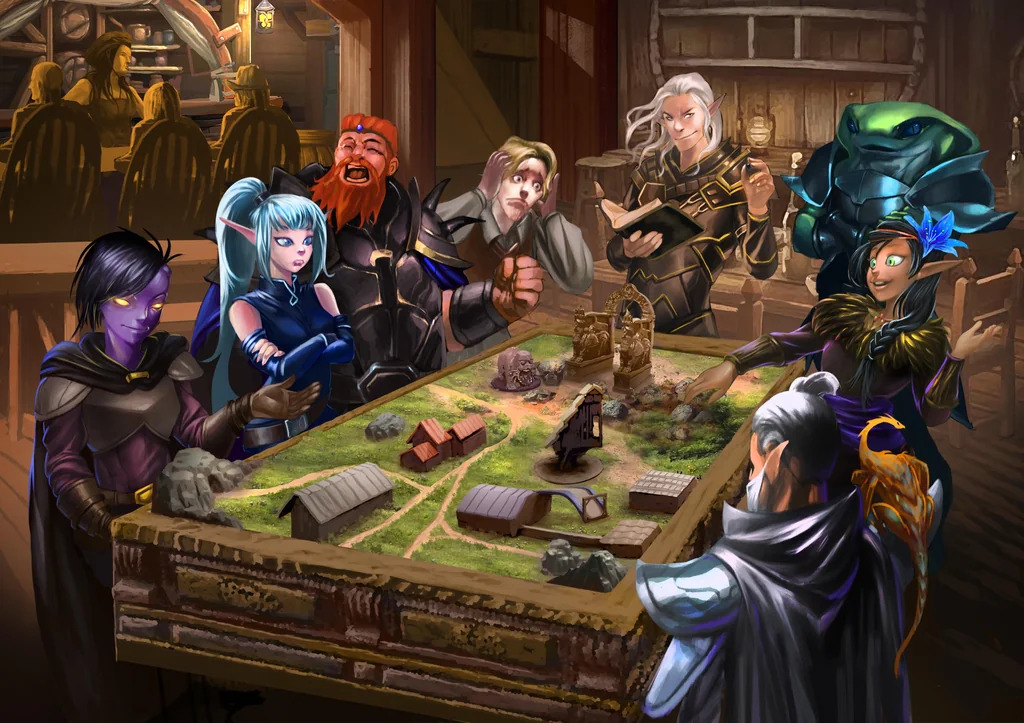
1. Enjoy the silence
Many GMs know this situation: you described the environment your players find themselves at, they checked out a few details – and then complete silence. The table stares you in the eye, expecting you to do something. Many GMs dislike this situation and overtake the storytelling in this moment. Don’t do that! Like Depeche Mode already sang in their famous hit: Enjoy the silence. A lot of GM’s just talk too much. Allowing the table (or voice chat) to be silent creates room for your players. They’ll eventually start to talk. And when they think of something to say, they will start to talk about the game. In the best case they’ll even speak through their character. Another side effect of silence is, that you give players who tend to not talk that much a chance to do it. Maybe they are a bit shy, maybe they don’t like to interrupt other players. My general advice is: as soon as you feel the silence becoming uncomfortable, wait another 15 seconds before you start to speak. The results will surprise you!
2. Use the character names to address your players
One of the goals of playing tabletop RPGs is to dive into an immersive world that you as GM create together with your players. Imagine your table like a stage play: Your players are the actors, and you are part time actor, part time director. And when you perform that play, you want to stay in your role. Players will tend to fall out of their roles. Sometimes they laugh about something funny another player did, sometimes they leave the table to go to the bathroom, or they’ll discuss about rules with you or why they should get advantage on that dice throw. That’s perfectly fine and you shouldn’t deny that. But while a game of TTRPG doesn’t need to be like a stage play 100% of the time – sometimes you need to play director and ask the characters what they do, not the players. If you rather go “Evelyn opens the chest and finds a letter inside it. Evelyn, what do you do with it?” instead of “Sarah, your character opens the chest and finds a letter inside it. What then?” it will drag your players back into roleplaying. You can combine that with the previous advice and after a period of silence call a random player by it’s character name, raising your voice a little: “Evelyn! What do you do?”. Works like a charm all of the time.
3. Encourage character traits
When a player creates his character, he has some kind of person in mind. That includes how he behaves, how he talks, what makes him angry, what makes him happy and so on. You can use that to your advantage, to challenge your players role play. One of your players portraits that big dumb orc, who get’s easily mad if you throw insults in his face? Let an NPC insult him. While this won’t work guaranteed all of the time, you still give your player the chance to role play. Let your NPCs comment on their look, let them remember something they did, or if you feel like the NPC could recognize a player being smart, let them say even that. Your world is organic, and having a 6’2“ orc who picks his nose in front of a nobleman will trigger some kind of reaction to that.
4. Ask your players to speak through their character
I can’t count how often I heard the following from a player of my campaigns: “My character will ask the guard if he grants us passage”. I learned to twit my players a little bit in such moments, and will usually respond with: “well, then do so.” They’ll will do it, and you can respond by role playing the guard, which creates a situation where the other players at the table can join.
5. Role play is not acting
One important thing to remember that role playing a character and acting are complete different things. While you can act in role play, it is not a requirement. A lot of players don’t like changing their voice, or dressing up, or acting in some kind of way. Tell them that they don’t need to. They can speak in third person about their players. Using descriptive language like “Evelyn is getting Goosebumps as she stares the wyvern into its deep red eyes. She take a step back and readies her sword” will create immersion without having to act weird in front of strangers or your friends.
Conclusion
I hope those five tips help you in your next session to even further create an enjoyable adventure. I’m sure that if you combine some of them, it will already be a big step forward in how your players use role play in your campaigns. What helps you to motivate role play from your players? Let us know in the comments.




Leave a Reply